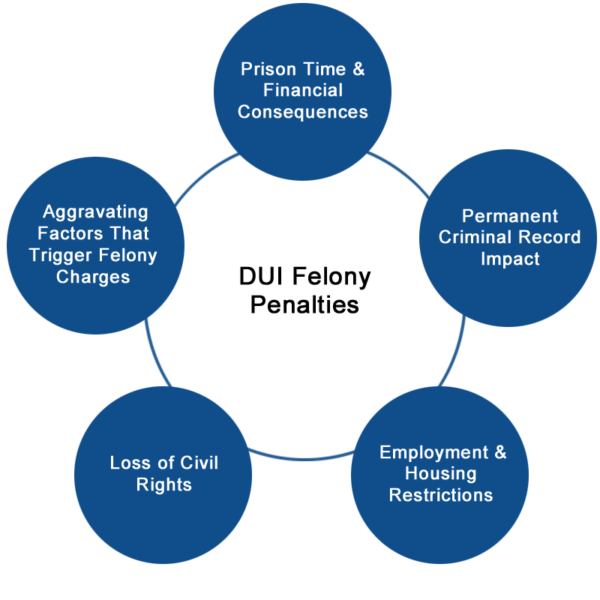Oklahoma DUI Felony
In Oklahoma, a regular DUI usually means you’re accused of driving with a blood alcohol content (BAC) of 0.08% or higher, or driving while impaired by alcohol or drugs, and it’s normally treated as a misdemeanor for a first offense. But certain circumstances can make the charge much more serious and turn it into a felony.
Misdemeanor vs. Felony Distinction
A misdemeanor is still a serious mistake, but it is not usually life-ruining. Think of it like getting a flat tire. It is stressful, costs money, and slows you down, but with the right steps, you can fix it and move on. Jail time for a misdemeanor is usually short, under a year, the fines are smaller, and it is far less likely to block you from career choices, housing, credit, or school opportunities for the rest of your life.
Example: Sarah, who has no prior record, gets pulled over for a broken taillight, blows a .09 on a breath test, and there is no crash. She might have to pay fines, take DUI classes, and temporarily lose her driver’s license, but if she completes everything as required, she can move forward without a felony record harming her future.
A felony is like your car getting totaled in a crash. With a fender bender (a misdemeanor), you might be inconvenienced, pay for repairs, and move on. But when your car is totaled, it’s gone for good. You can’t just buff it out or replace a few parts—it changes what you drive, how you get around, and even your insurance for years to come. A felony works the same way. It’s not a quick fix; it’s a permanent change that can limit where you work, where you live, and what you can do for the rest of your life. Felonies carry long prison sentences, huge fines, and a permanent criminal record that can follow you for life. That record can make it extremely hard to get a good-paying job, rent an apartment, obtain credit, own a firearm, or even vote, potentially forever.
Example: Mike was convicted of a DUI seven years ago. One night, after having several drinks, he speeds through a red light and slams into another car. The crash leaves the other driver with a broken arm and a concussion. Because Mike already has a prior DUI and, this new incident caused serious injury, prosecutors filed it as a felony DUI. Now he’s facing years in prison, thousands in fines, a long license suspension, and a permanent felony record that will follow him for life.
Aggravated DUI Versus Felony DUI in Oklahoma
In Oklahoma, the terms Aggravated DUI and Felony DUI are often used interchangeably. Aggravated DUI refers to a DUI offense with aggravating factors such as a BAC of 0.15% or higher, having a child passenger, or causing serious injury. Felony DUI typically applies to repeat offenders with prior DUI convictions or serious incidents like injury or death caused by impaired driving. With the law changing on November 1, 2025, both terms are expected to become more prevalent for those facing more serious penalties related to DUI and APC.
Personal Consequences of a Felony Conviction
A felony record follows you for life. You could lose the right to vote or serve on a jury, face barriers to getting jobs or housing, and be blocked from obtaining professional licenses. A felony can also stop you from owning a firearm, getting a passport, or traveling internationally. Some countries, such as Canada, may deny entry altogether. You may be refused travel visas, face restrictions when crossing borders, and lose access to certain government assistance or career opportunities for years or permanently.
In addition, a felony conviction can have serious consequences in child custody cases. Judges may view a felony record as evidence of poor judgment or an unsafe environment, which can limit or completely remove your custody or visitation rights. Even if custody is not fully revoked, the court may impose supervised visitation or other restrictions that make it more difficult to maintain a relationship with your child.
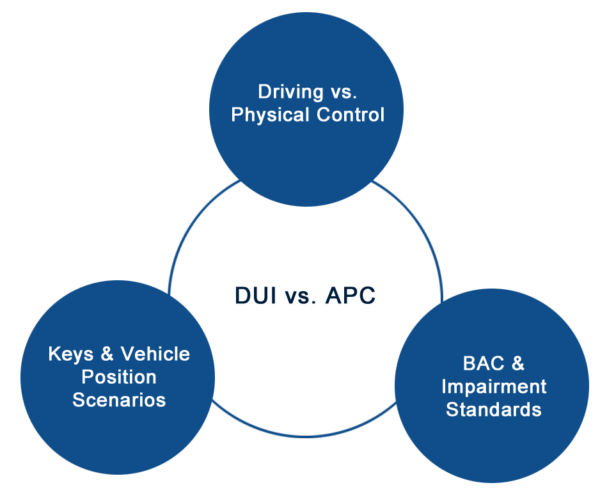 DUI vs. APC – The Basics
DUI vs. APC – The Basics
A DUI (Driving Under the Influence) in Oklahoma means you were operating a motor vehicle while impaired by alcohol or drugs, or your blood alcohol concentration (BAC) was 0.08% or higher.
An APC (Actual Physical Control) means you were not necessarily driving, but you were in a position where you could have driven while impaired. The vehicle does not have to be moving. Prosecutors only have to prove you had the ability to start and operate it.
Example: You fall asleep in the driver’s seat after drinking, with the keys in the ignition to keep the heat running. Even though the car never moved, you could still be charged with APC because you were in control of the vehicle and capable of driving while impaired.
When a DUI or APC Becomes a Felony
A misdemeanor DUI (Driving Under the Influence) or APC (Actual Physical Control) can be upgraded to a felony under certain circumstances:
- BAC of .15% or higher
Example: Jason gets pulled over after swerving on the highway. His breath test shows a BAC of 0.16%. Even though no one was hurt and it’s his first DUI, the high BAC level pushes the charge into felony territory. - A child is in the car
Example: Sarah is driving home from a party with her 6-year-old son in the back seat. She’s pulled over for running a stop sign and fails the breath test. Because a child was in the vehicle, the misdemeanor charge is elevated to a felony. - Someone is seriously injured or killed in a crash
Example: Mike runs a red light after drinking and collides with another car, leaving the driver with a broken leg and permanent scarring. The injury makes this a felony DUI, even if it’s his first offense. - You have prior DUI or APC convictions within the last 10 years
Example: Lisa was convicted of DUI eight years ago. She’s caught again after weaving between lanes. Even though no one is injured this time, the prior conviction within 10 years means this new charge will be filed as a felony. - You have a prior deferred sentence for DUI or APC
Example: Tom completed a deferred sentence for DUI five years ago. When he’s arrested for DUI again, the prior deferred plea is counted as a prior offense, which bumps the new case up to a felony. - The charge involves manslaughter
Example: David is driving drunk and loses control on a curve, hitting a pedestrian who later dies. He is charged with felony DUI manslaughter, which carries far more severe penalties than a standard DUI. - Second or Third DUI within 10 years
A second DUI, even if the first case ended in a deferred sentence, can still be charged as a felony. A third DUI, regardless of prior outcomes, also becomes a felony with more severe penalties.
Example: You were arrested for DUI in 2018 and received a deferred sentence. In 2025, you’re arrested again for DUI. Even though the first case was deferred, this second offense within 10 years is a felony, punishable by 1 to 5 years in prison. If this is your third DUI, the penalty increases to 1 to 10 years in prison.
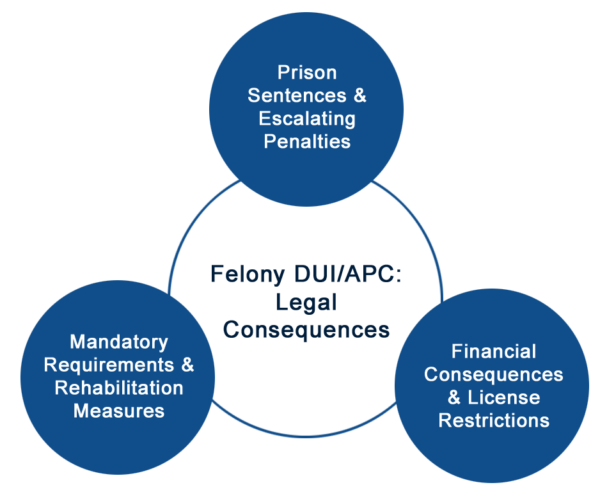 Felony DUI/APC Penalties
Felony DUI/APC Penalties
- First Felony: 1 to 5 years in prison or probation, up to $2,500 fine, license suspension up to 3 years, ignition interlock device (IID)
- Second Felony: 1 to 10 years in prison, up to $5,000 fine, longer suspension, community service, stricter probation
- Third or More: 1 to 20 years in prison, higher fines, long suspension, mandatory treatment
Other Sanctions: Probation, court- or judge-imposed rules, completing an alcohol and drug assessment with a certified counselor or therapist and following all recommended treatment or education programs, random drug and alcohol screening, an alcohol ban, installation of an ignition interlock device (IID) on your car, curfew, GPS monitoring, attendance at a victim impact panel, completion of community service, and restitution to any victims.
License Suspension and IDAP for Felonies
In Oklahoma, a first felony DUI, which is usually your second DUI within ten years, results in a one-year driver’s license revocation. A second felony DUI, most often a third DUI within ten years, increases the revocation to a minimum of three years.
IDAP (Impaired Driver Accountability Program): Let’s you keep driving with an IID if you sign up quickly, complete treatment, and avoid violations.
Example: Maria’s license was suspended for 3 years after a felony DUI, but she was able to drive to work and school because she entered IDAP and followed the rules.
Oklahoma Felony DUI Hardship License
In Oklahoma, you cannot get a hardship (work permit) license for a felony DUI suspension. To get your license back, you must serve the full suspension and complete all requirements, including the Impaired Driver Accountability Program (IDAP)
New Felony Distinction Rules for Oklahoma DUI Cases Effective November 1, 2025
In the past, felony DUIs were usually reserved for serious cases such as repeat offenders, crashes causing serious injury or death, or drivers with children in the car. Starting November 1, 2025, that is no longer the case. A new law makes it possible for even a first-time DUI arrest to be charged as a felony aggravated DUI if certain driving behaviors are involved. Many of these behaviors used to be considered minor traffic violations.
What This Means: Even without a crash or prior record, you could now face felony charges simply based on what police believe is impairment combined with risky driving. This change means many more felony DUI charges and far greater consequences for first-time offenders.
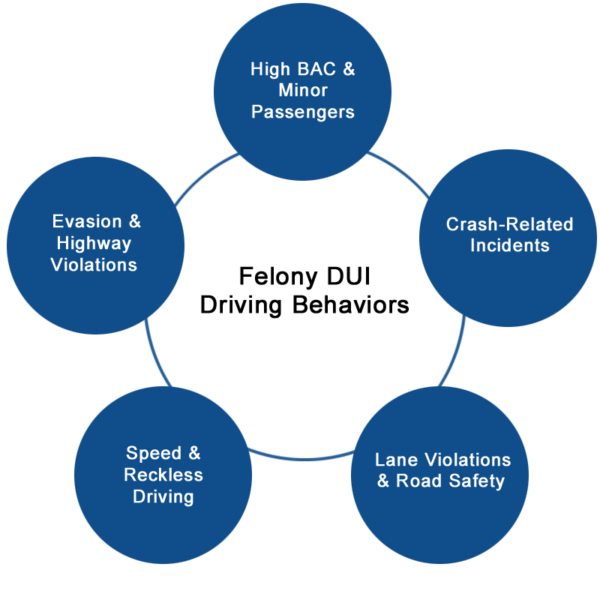 Driving Behaviors That Can Now Turn a DUI into a Felony
Driving Behaviors That Can Now Turn a DUI into a Felony
- Blowing a 0.15 or higher on a breath test
- Getting into a crash that causes injury, death, or $500+ in property damage
- Driving on the wrong side of the road
- Passing another car unsafely from the opposite direction
- Crossing over the center line
- Not staying in your lane or failing to signal
- Breaking the rules on divided highways
- Trying to get away from a police officer
- Driving 20 mph over the limit, or 10 mph over in a school zone
- Having a passenger under 18 in the car
- Driving recklessly
Real-World Examples of How the New Law Works
- BAC is 0.15% or higher: Before, this was a misdemeanor aggravated DUI if no one was hurt. Now it is automatically a felony.
- Crash causing injury, death, or $500+ in damage: Before, this was a misdemeanor DUI plus a traffic ticket. Now it is a felony. Example: Rear-ending someone with $800 in bumper damage.
- Driving on the wrong side of the road: Before, a traffic violation. Now a felony if impaired.
- Passing illegally on the left: Before, a ticket or misdemeanor. Now a felony if impaired or over the limit.
- Crossing the center line: Before, a warning or ticket. Now a felony if impaired.
- Failure to maintain lane or signal: Before, a citation. Now a felony if impaired.
- Divided highway violation: Before, a basic traffic offense. Now a felony if impaired.
- Eluding a police officer: Before, a separate misdemeanor. Now a felony aggravated DUI.
- Speeding 20+ mph over the limit or 10+ in a school zone: Before, speeding plus possible DUI. Now a felony.
- Passenger under 18: Before, possibly child endangerment. Now an automatic felony aggravated DUI.
- Reckless driving: Before, a misdemeanor or citation. Now a felony if impaired.
Fighting Felony Charges is the Only Way Forward
Once you are facing a felony charge, the consequences will not go away on their own. Pleading guilty locks in the damage. The best way to protect your future is to fight with a strong legal defense. The right attorney could get your case reduced, dismissed, or even win an acquittal at trial.
A proactive step is refusing to give police the evidence they need. Many defense attorneys advise not taking the breath test, not performing field sobriety tests, and asking to speak with an attorney immediately. While refusing these tests can cause a possible driver’s license suspension, this suspension can often be challenged and lifted if you act quickly. By requesting an Administrative License Suspension (ALS) hearing, your attorney may be able to stop the automatic suspension and protect your driving privileges while your case is pending. Acting early can mean the difference between a conviction and keeping your future intact.
Preparing to Win
If you’re charged with felony DUI, your case can be dismissed, reduced, or even acquitted in court. The Edge Law Firm has successfully won tens of thousands of DUI cases, showcasing our expertise in handling felony DUI charges and securing favorable outcomes for our clients.
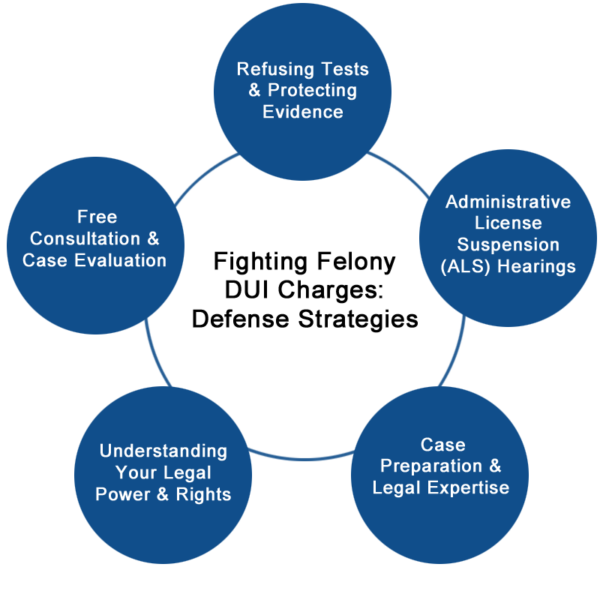 You Hold Equal Power in the Legal System
You Hold Equal Power in the Legal System
The justice system works for those who actively use it to their advantage. You have just as much power as the prosecution, and once you recognize this, you regain control over your case and future.
Preparing for Success
Winning a felony DUI case comes down to preparation. The side that is best prepared prevails. The Edge Law Firm is known for out-preparing the police and prosecution. We take the time to gather crucial evidence, build a strong relationship with you, and present the most convincing argument in court. Our extensive preparation ensures that your side of the story is heard and your defense is solid, giving you the best chance at a favorable outcome.
Schedule a Free, No Obligation Case Evaluation
The Edge Law Firm offers free, no-obligation consultations for individuals facing felony DUI charges. During this confidential evaluation, potential clients can speak directly with an experienced criminal defense team to better understand their legal situation and explore available options. These consultations typically last an hour or more and are fully protected by attorney-client privilege under Oklahoma law, ensuring all shared information remains private. Clients will have the opportunity to discuss the details of their case, ask questions, and receive informed guidance. The legal team will also ask key questions to fully understand the specifics of the situation. After the consultation, The Edge Law Firm will begin gathering evidence, building a defense strategy, and provide a clear quote for legal services.
To schedule your consultation, please fill out the form below or call (918) 582-6333.
Please submit our secure contact form below:

